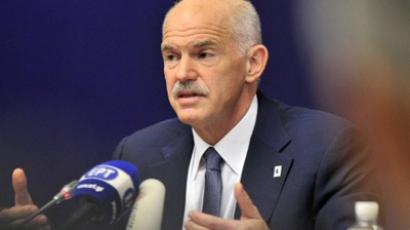Greek PM scraps plan for referendum
Greek Prime Minister George Papandreou has scrapped his plan for a referendum on the EU bailout package. Earlier he denied rumors of his possible resignation.
During his speech in parliament on Thursday he warned that early elections would be “catastrophic”, entailing a high risk of bankruptcy and even lead to an exit from the euro.The confidence vote for the government is expected on Friday.He also invited the opposition join the debt-deal negotiations.“If the opposition is willing to negotiate, we could ratify the eurozone bailout deal”, he is quoted as saying by AP.The Greek finance minister, Evangelos Venizelos, also confirmed that the country will not be holding a referendum.
Papandreou came under growing pressure to resign after calling a referendum. His finance minister, Evangelos Venizelos, declared on Thursday he was against that move. At first he supported Papandreou’s decision, but changed his mind after his and the PM’s meeting with French President Nicolas Sarkozy and German Chancellor Angela Merkel. On the eve of the G20 emergency talks on Wednesday, the top Greek officials were summoned by the eurozone’s two most-powerful politicians as well as the IMF and ECB. The message they wanted to deliver was that his country needs to play by EU rules or leave the eurozone. Earlier, some parties who dislike the idea of a referendum demanded that a coalition government be formed. That idea came from several deputies of the country’s ruling PASOK socialist party. Similar claims came from conservative Opposition Leader Antonis Samaras. He insists on the formation of a transition government and the immediate ratification by parliament of the new eurozone debt agreement.The referendum in Greece over the 130-billion-euro bailout program to relieve the country’s finances sparked concern across the eurozone that banks will not restructure the Greek debt until the results of the ballot emerge. This has sent the eurozone into weeks of financial uncertainty, with markets deflating.
‘Euro not out of trouble but will live to see another day’
In spite of the chaos in the markets for the past couple of days, this Greek gamble on the referendum seems to have yielded a positive result, says Thomas Thygesen, chief strategist at SEB Merchant Banking. “I think the important thing here is that it looks like you are going to get both sides of the Greek political spectrum onboard for the agreement with the EU – that is what was needed for credibility.”This could have been achieved with a referendum, but if now it ends up in a political deal with the same result, Goodman believes it’s clearly positive – at least in the short-term.While some doubt that it’s wise of European leaders to try to keep Greece in the eurozone, Thygesen argues that even if it’s probably true that the country shouldn’t have joined in the first place, now there are two reasons to keep them in.“[The EU] is obviously some kind of long-term nation-building project – you wouldn’t kick New York or Kansas out of the US just for some kind of financial misbehavior. If you want to keep this thing together for the long term, you’ve got to show some kind of solidarity.”
RT producer, Demetri Kofinas, thinks Greece is heading for an inevitable default.”There is a huge debt problem in the West in general, and Greece is just a whipping boy,” he declared. “The fact that politicians are myopically focused on Greece and the idea that they can solve this in general by adding more debt is absurd. Greece is going to have to default and the way it looks right now it is more likely that it’s going to be a disorderly unilateral default.”Speaking about the on-and-off referendum Kofinas says that no-one really understands why the prime minister called for a referendum in the first place. ”It could have been a political ploy to try to get the opposition to join up on him and support the bailouts so he didn’t have to continue pushing this through with a very slight majority,” he said. “He’s going to face a vote of confidence tomorrow. He might very well lose it.”














